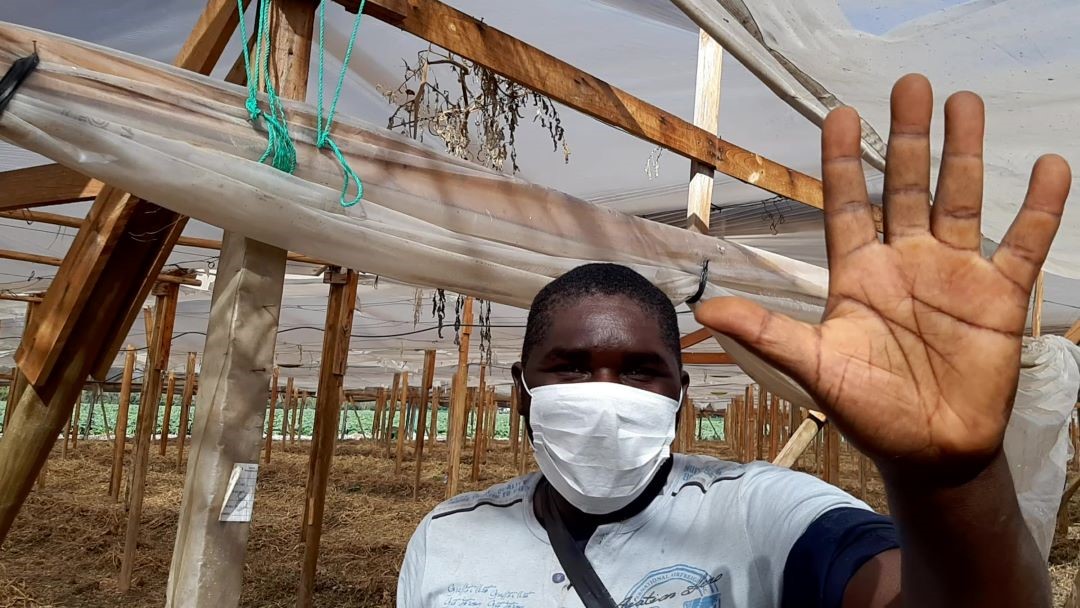A Creole version of the campaign “El Campo se cuida” (“The countryside takes care of itself”) had been launched in Chile within the framework of a joint initiative between IICA and the companies ANASAC and UNIFRUTTI, given the large number of Haitians who work the land in that Andean country.

Santiago, 14 August 2020 (IICA). – Hand washing, adequate use of masks, social distancing, cleaning and disinfection are the five basic pillars for preventing the spread of Covid-19 among men and women involved in agriculture. This will allow for maintaining the continuity of work under strict safety measures as well as the continuous operation of the production chain that guarantees our food supply.
To help spread this message among small, medium and large-scale farmers, as well as all other individuals who work the land, the Inter-American Institute for Cooperation on Agriculture (IICA), together with the private companies ANASAC and UNIFRUTTI, launched the campaign “El campo se cuida” (“The countryside takes care of itself) in Chile. The campaign included messages in Creole, given the large number of Haitians employed on Chile’s farms.
The initiative received support from the Ministry of Agriculture of Chile. During the launch event, José Ignacio Pinochet Olave, the Chilean Undersecretary of Agriculture, highlighted the importance of cooperation between the public and private sectors and international organizations.
“We believe these linkages are natural and form part of the solution. Through this campaign, you are transmitting a crucial message, and I would highlight the fact that you are also doing so in Creole, taking into account the large number of people who carry out important work in the countryside”, stated the Undersecretary.
“It is important to reach these farmers because this is a chain, and times of crisis call for increased collaboration and joint efforts”, added the official.
A Creole version of the video series was developed to directly reach the large number of Haitian nationals who work in Chile’s agrifood sector.
To this end, IICA, which has offices in 35 countries, requested support from its office in Haiti to prepare the campaign. The office assisted in translating and reviewing the material.
“We are facing a pandemic that has had unexpected consequences on our agriculture sector. We have a social responsibility to contribute to disseminating messages on ways to prevent the spread of the virus in Chile’s countryside”, stated Gabriel Ormeño, General Manager of ANASAC, which offers a variety of products in 30 different countries.
More than 70% of Chile’s fruit and vegetable products are exported.
The campaign comprises six videos that illustrate the five pillars of self-care through audiovisual material prepared by ANASAC and IICA technical specialists. The videos also review prevention protocols for all phases of agricultural production (arrival at the farm, post-harvesting, storage, transport and sale), providing clear recommendations for all processes.
UNIFRUTTI is a large company that produces and exports fresh fruit in South Africa, the Philippines and Chile. ANASAC, meanwhile, is a Chilean company that has been in operation for more than 70 years, and whose mission, since its inception, has been to increase agricultural productivity and markets for crop protection, seeds, veterinary services and agricultural mechanization.
All of the campaign’s material is available at elcamposecuida.cl. This open content can be shared on social media and chat applications.
The campaign “El Campo se Cuida” has achieved great visibility in Chile thanks to a partnership with the prestigious media outlet El Mercurio de Valparaíso, which, together with SoyChile, its national network of regional media outlets, has made it possible to reach more than 4 million people throughout the country.
The campaign has also been presented in roundtable discussions and seminars to more than a thousand specialists who work in the countryside every day.
“This is meant to serve as a guide for extension workers, producers and field workers, facilitating the adoption of the five basic principles of self-care. Amidst the Covid-19 pandemic, agriculture has demonstrated its leading role; however, it is important that those who form part of the agrifood chain take care of themselves and their families, and follow standards and protocols for preventing infection”, stated Hernán Chiriboga, IICA Representative in Chile.
“It is time for us to come together and collaborate, to guarantee the continuity of work in the countryside”, he added.
The campaign will continue for the duration of the pandemic. The materials can be accessed and shared at www.elcamposecuida.cl.
You can watch a part of the Creole version of the campaign here https://www.youtube.com/watch?v=Nui8wj9PCGw.
More information:
Institutional Communication Division
comunicacion.institucional@iica.int











